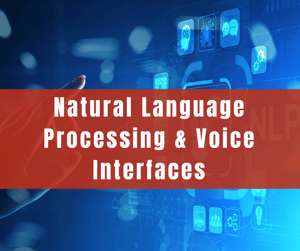-1-4.png?width=300&name=Blog%202%20(1)-1-4.png)
Burgeoning technology has given rise to time-saving and cost-cutting business opportunities. Whether it’s wireless sensors integrated with the Internet of Things or predictive analytics, new technology is spearheading the way for innovative business solutions. One such contemporary example is in natural language processing (NLP). Below, we’ll break down essentials of natural language processing, how it translates into voice interface technology, and the influence and benefits they both provide for the modern factory environment.
Natural Language Processing
Natural language processing is a machine’s ability to process human language via speech, structure the information received, determine the necessary response, and then respond in a language we understand. This is utilized in day-to-day life with various voice interfaces such as Alexa from Amazon, Siri from Apple, and the Google Home. This level of speech processing is becoming more and more prevalent in today’s society, streamlining the ability to communicate and access information. But how does this translate to a factory setting? Below we’ll talk about the advantages natural language processing and voice interfaces/chatbots have in a modern factory setting.
Advantages
Here are just a few examples of benefits that natural language processing and voice interfaces can provide for your business:
- Quicker Data Entry: In a modern factory environment, some workers are still spending exorbitant amounts of time and energy manually inputting data by hand. In spite of the progress made by IIoT, a researcher found that it can take an average of 10-15% of an employee’s day to input data. Using voice interface technology in conjunction with natural language processing, data input speed can be up to ten times faster than manual data entry. This, of course, saves your business time and money and allows your employees to focus on more pressing issues.
- Increased Productivity: Less time performing tedious data entry tasks means your employees can instead hone their attention on critical duties. Instead of slaving away behind a computer, employees can be monitoring the production floor and contributing in other meaningful ways.
Still a Long Way to Go
While natural language processing and voice interfaces are new and fascinating technologies, the true market in factory manufacturing and automation has yet to be fully defined. Issues like data privacy and errors in speech-to-text technology are still at the forefront of peoples’ minds. However, as the technology grows more sophisticated with each passing day, we will surely see NLP and various voice interfaces come to factory settings to streamline workflow and increase productivity.
Interested in learning more? Connect with an ACD expert!
You may also be interested in reading:

